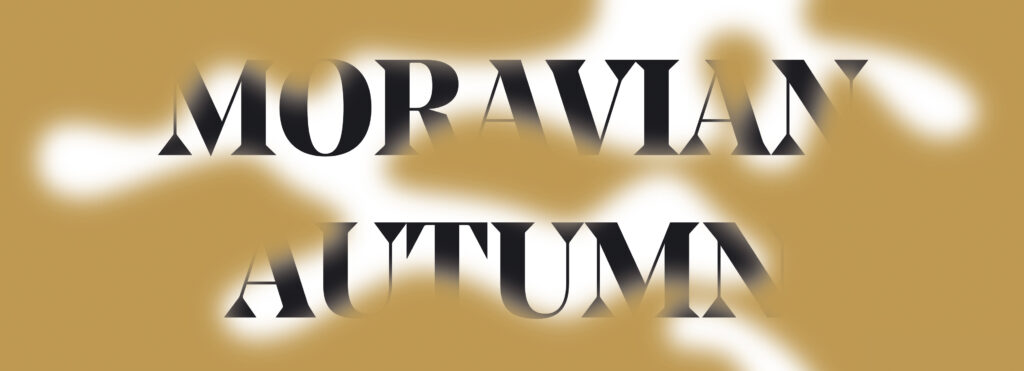ANGELOI – MESSENGERS or A parallel history of music
Neglected works by great composers, great works by neglected composers
According to the philosopher Yakov Druskin, a messenger, or angelos in Greek, is a being who lives in a parallel world and whose life passes in stasis. This is no dull, empty or boring life, because dullness, emptiness and boredom are a result of time, which does not exist in the parallel world. Messengers are not burdened by time and experience eternity.
Musical works can also be considered such messengers, because since their inception they “inhabit”, in their diversity, a timeless, parallel space, from which the contemporary concert practice of so-called classical music repeatedly selects only a very limited segment for its “here and now”, thereby claiming to define the history of music by choosing those pieces that have “the right to survive”. Filharmonie Brno has long sought to disrupt this approach, and Moravian Autumn 2023, organised by the orchestra, is a concerted effort to carry out a survey of a “a parallel history of music”, noting the less-known aspects of works by celebrated composers and highlighting the viability of works by neglected composers.
The programme of the opening concert is telling in this regard: in collaboration with the pianist Polina Osetinskaya, the Slovak Philharmonic Choir and, under the baton of its chief conductor Dennis Russell Davies, Filharmonie Brno will perform works by Anthony Philip Heinrich (the symphonic fantasia The Wild Wood Spiritʼs Chant), Ludwig van Beethoven (the rarely presented Fantasy in C minor), Arvo Pärt (Credo from the close of his early, avant-garde period) and Alexander Scriabin (the symphonic poem Prometheus, with lighting provided by Cori O’Lan of the renowned Linz festival Ars Electronica).
At his recital, the pianist and musicologist Pavel Farský will introduce, in words and music, Anthony Philip Heinrich, the first professional American composer who was born in Bohemia, in Krásný Buk near Česká Lípa and who was dubbed the “Beethoven of America”. And there will be more works by composers residing in the “parallel music world”, who have a Czech connection: in what will probably be a modern world première, the melodrama Abschied der Johanna d’Arc von ihrer Heimath and Gelegenheitskantate by Anton Reicha, led by the British conductor Jonathan Cohen; while the soprano Martina Janková, with Dennis Russell Davies as pianist and with the actor Taťjana Medvecká, will present the substantial cantata Lenora by Václav Jan Tomášek. The festival also features copious Czech composers of the 20th and 21st centuries: Leoš Janáček, Karel Reiner, Marek Kopelent, Martin Smolka and Martin Brunner (who is writing a new piece commissioned by Moravian Autumn).
Some time ago, there was a revival in our country of interest in the works of Jan Dismas Zelenka, and Poland has similarly rediscovered the oeuvre of the early Baroque composer Mikołaj Zieleński; his music will be brought to Brno by the Wrocław Baroque Ensemble.
The Icelandic composer Jóhann Jóhannsson was celebrated towards the end of his fairly short life for his film music (he was nominated for an Academy Award for his scores to The Theory of Everything and Sicario, and won a Golden Globe for the former), but it is mainly his early, solitary works that offer particularly interesting projects, for example, the sound installation Virðulegu forsetar, in a first Czech performance by the Moravia Brass Band assisted by the Belgian musician Adam Wiltzie, Jóhannsson’s erstwhile close collaborator.
Musical instruments that have been sidelined over the years can be the messengers from a parallel world too: Moravian Autumn will showcase the glass harmonica (operated by Christa Schönfeldinger) and the historic Streicher piano (played by Alexei Lubimov).
In addition to presenting works in Czech and world premières, the Moravian Autumn programming has traditionally sought to have the various concerts and projects communicate with each other. The cyclical aspect is noteworthy: examples from both the orchestral and piano oeuvres by Heinrich will be presented; Dennis Russell Davies will conduct two orchestras; the motif in Beethoven’s Fantasy in C minor is identical to that of the song Seufzer eines Ungeliebten and Gegenliebe, which later crystallised into the popular theme of the Ode to Joy set to music in the Ninth Symphony; and the list could go on.
Moravian Autumn will be the stage for a splendid celebration of the 50th anniversary of the partnership between Brno and Leipzig. Dennis Russell Davies will lead at two concerts both of the orchestras of which he is currently the chief conductor, Filharmonie Brno and the MDR-Sinfonieorchester, the latter event being a 85th birthday salutation for the major American composer William Bolcom in the form of the first Czech performance of his recent Second Piano Concerto. The philharmonic orchestra of another city with which Brno is partnered, Poznań, together with Milan Paľa and its chief conductor Łukasz Borowicz will mark the 90th birthday of Krzysztof Penderecki and also perform folklore-inflected works by Karol Szymanowski and Vítězslava Kaprálová.
In addition to these artists, orchestras and ensembles, the festival will feature the pianists Emanuele Arciuli and Onutė Gražinytė, the Kremerata Baltica, the cellist Jiří Bárta, the pianist Terezie Fialová and the young hopefuls of Czech chamber playing, Trio Bohémo, who have already won multiple awards.
The supporting programme will also be rich, and include the second year of the New World of Moravian Autumn, an event prepared by Janáček Academy of Performing Arts students, conversations with composers, performers and musicologists, and a musicological colloquium organised by the Masaryk University Institute of Musicology.
Vítězslav Mikeš, Moravian Autumn programmer


